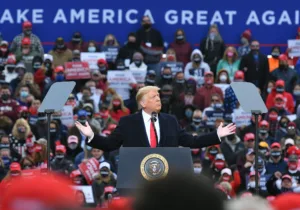A new South Korean film, Operation Chromite, is about a South Korean undercover team that rambunctiously clears the way for Douglas MacArthur’s celebrated 1950 landing at Inchon, which rescued the South from communist North Korean occupation.
My first time viewing a Korean film, it was melodramatic, mawkish, and often absurdly over the top, drenched in extravagant South Korean patriotism and anti-communist excitation. Reviewers hate it. I loved it! So too would MacArthur, the personification of maudlin schmalz, who is justifiably the story’s heroic patriarch, and who is portrayed as a fearless war god, just as he would have hoped.
In its details the film is often more drama than factual. The covert team in real life was led by an American intelligence officer to perform reconnaissance around occupied Inchon, clear North Korean mines, and wage guerrilla war on the enemy in the preamble to MacArthur’s surprise arrival. As a Korean film, the team is led by a former communist turned South Korean patriot, whose fearsome band kills and blows up much of the North Korean occupation force even before MacArthur appears on the horizon. It resembles the 1961 film Guns of Navarone with Korean versions of Gregory Peck, David Niven, and Anthony Quinn.
In real life, the Koreans who served on this team were indeed extraordinarily heroic. So too were the civilians who helped them, many of them were discovered and executed by the North Koreans. Hollywood would have trouble producing this film, with its unabashed anti-communism. Occupied Inchon is shown as an Orwellian prison festooned with banners of Josef Stalin and his disciple, North Korean founding tyrant Kim Il Sung, who later appears in person plotting the defense of Inchon in his white uniform. Dissidents are instructively hanging from lamp posts. “Ideology is thicker than blood,” Russian speaking North Koreans counsel as they order their subjects to execute family members. The extermination of Christians and religious belief is referenced.
North Korea’s Soviet backed invasion was brazen aggression that threatened the still embryonic post WWII liberal order that the U.S. had hoped to orchestrate through the United Nations. The UN role in defending South Korea was an early and still rare instance of multilateral defiance of aggression. Inchon, which routed North Korea after its near complete occupation of the South, was America’s greatest military victory in Korea and MacArthur’s greatest personal triumph.
MacArthur is portrayed commendably by Liam Neeson as stoic and visionary. As MacArthur overlooks his departing invasion force he looks like Caesar preparing his legions to invade Gaul. The fleet of 200 warships slicing through stormy night waters with MacArthur at the helm seems like a martial angelic host avenging devilish injustice. As the South Korean covert team on shore captures and ignites a light house to illuminate the arriving invasion, MacArthur is at the helm of his battleship, quoting God’s proclamation in Genesis: “Let there be light!” It’s all great fun, and better than the Unification Church-funded 1981 film Inchon, which I saw as a boy, with Laurence Olivier as MacArthur, who concluded that widely reviled movie by leading the liberated South Korean parliament in the Lord’s Prayer.
Neither film fully included a key scene of the real drama behind the Inchon landing, which MacArthur singularly championed against nearly unanimous opposition in Washington. In Operation Chromite, two generals appear in Tokyo to dissuade MacArthur, with the chief confrontation between MacArthur and Air Force chief General Hoyt Vandenberg, who actually did not make that trip.
In actuality the military joint chiefs, except Vandenberg, joined by diplomat Averell Harriman, convened with MacArthur, who was adamant:
I cannot believe that a great nation such as the United States cannot give me these few paltry reinforcements for which I ask. Tell the President that if he gives them to me, I will, on the on the rising tide of the fifteenth of September, land at Inchon and between the hammer of this landing and the anvil of the Eighth Army, I will crush and destroy the army of North Korea.
Reputedly MacArthur’s theatrics caused spines to tingle and hair to stand on end among his electrified listeners. He added for further drama:
I can almost hear the ticking of the second hand of destiny. We must act now or we shall die. We shall land at Inchon and I shall crush them!
So he did. What a superb scene for a film oddly to exclude. Liam Neeson could have made the most of it. One fun tidbit that is in the film: MacArthur’s young aide Alexander Haig is earnestly portrayed at the side of his commander. Haig, of course, would go on to greater fame.







 Sponsor a student for Christianity & National Security 2024
Sponsor a student for Christianity & National Security 2024